
|
![]()
Greatest Films of the 1950s
1950 | 1951 | 1952 | 1953 | 1954 | 1955 | 1956 | 1957 | 1958 | 1959
Title Screen Film Genre(s), Title, Year, (Country), Length, Director, Description 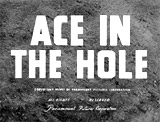

Ace in the Hole (1951) (aka The Big Carnival), 111 minutes, D: Billy Wilder
Director/co-writer Billy Wilder's uncompromising, and harsh noirish commentary was a scathing attack on the sensationalizing and ruthless tabloid mass media. It was the 50's version of the 70's Network (1976) and of the 80's Broadcast News (1987). Charles 'Chuck' Tatum (Kirk Douglas) - a belligerent, self-obsessed, unscrupulous big-city newspaper reporter found himself working for the Albuquerque Sun-Bulletin (with its hand-embroidered motto "Tell the Truth"). He had been fired from previous jobs for alleged libel, cheating with the boss' wife, hot-headedness and drunkenness. Contemptuous of New Mexico and utterly frustrated after a year there, he missed New York after being stuck in New Mexico for a year: ("...Too much outdoors. Give me those eight spindly trees in front of Rockefeller Center any day. That's enough outdoors for me...). To stir up excitement and readership and to jump-start his career, he exploitatively stage-managed an "ace in the hole" media-frenzied story - an orchestrated operation to rescue good-hearted Leo Minosa (Richard Benedict), the adult son of a trading post owner, trapped by a cave-in of rocks 250 feet inside an ancient, haunted Indian cliff dwelling (Mountain of the Seven Vultures) where he was looting it of artifacts in the remote town of Escudero (three hour's drive from Albuquerque). He perpetuated his sleazy, hustling scheme with Leo's long-suffering, jaded, and unhappy femme fatale wife Lorraine (Jan Sterling) who had a five-year unfulfilled marriage to Leo. The opportunistic young woman first considered running off, but was hustled by Tatum to remain when he suggested that there would be monetary rewards for staying and pretending to be a grieving wife. She was easily persuaded by the promise of revenue from gathering throngs to remain with her ailing husband. Tatum also manipulated the local corrupt Sheriff Gus Kretzer (Ray Teal) up for re-election to help in his scheme. He was able to delay rescue efforts that would have taken only about 12-16 hours (by simply shoring up the mine and pulling Leo out), but instead convinced the crew to drill from above (a 6-day job). In the meantime, the rescue site became a frenzied tourist attraction - a literal circus (S & M) amusement park and carnival, and a camp ground, with rising admission prices and everyone taking lucrative advantage of the situation. Ultimately, last rites were administered by a priest to pneumonia-stricken Leo after 6 days of being unnecessarily trapped in the cave-in. Afterwards, Tatum delivered a memorable speech to the crowds to go home after Leo's death. In the shocking conclusion, the bleeding, defeated journalist Tatum collapsed at the feet of his editor-in-chief Mr. Jacob Q. Boot (Porter Hall).



The African Queen (1951), 105 minutes, D: John Huston
Director John Huston's Technicolored classic romantic adventure-comedy and war-related film was based on the 1935 novel by C.S. Forester - it told about an 'odd-couple's' unlikely romance within an exotic locale (in German East Africa at the start of the Great War). In the film's opening, the main characters were introduced, first, coarse, gin-swilling river rat captain Charlie Allnut (Oscar-winning Humphrey Bogart) on a crude tramp steamer The African Queen, whose duty was to deliver supplies and mail to two British Methodist missionaries in German East Africa, and then Reverend Samuel Sayer (Robert Morley) and his iron-willed, spinster sister Rose Sayer (Katharine Hepburn). They were ministering to natives in the remote village of Kungdu. Charlie's personality and social class were drastically contrasted with the lives of the Britishers - he was grubby, belligerent, gin-swilling and boozing, cigar-smoking, and uncouth in language, while she (and her brother) were prim, pious, tee-totaling, proper, sober and religiously fervent. With the start of the Great War (between England and Germany), the threat to the personal lives of the English missionaries was dramatically increased. The Germans arrived to destroy the village and mission, and the assault caused Rose's injured brother to become feverish and delirious, and he soon died from insanity. Charlie returned to offer Rose safe passage and a place to hide and escape on his boat on a trip down the Ulanga-Bora, while he simultaneously tried to hide the fact from the Germans that he had contraband cargo composed of oxygen and hydrogen cylinders and blasting gelatin. An adversarial relationship soon developed by the unlikely pairing of Charlie and Rose. He called her a "crazy, psalm-singing, skinny old maid," and she denounced his alcoholism by draining his whiskey bottles into the river. She also used the 'silent treatment' on him to get her way. Charlie mimicked the look and sounds of submerged hippos and scratching baboons on shore as they floated along. From almost the very beginning, Rose kept announcing her firm intentions and crazy plan to outfit the African Queen with home-made torpedoes, in order to sabotage, attack and sink a German worship at the end of the river. Charlie mimicked Rose by responding: "What an absurd idea!" The two experienced numerous roller-coaster, down-river encounters with Germans (they had to pass by a German fort in daylight), and then had to traverse treacherous rapids. As they faced various obstacles and challenges and often quarreled, the two also began to develop a strange love and admiration for each other. He spoke to her as if she was his queen: "Pinch me, Rosie. Here we are, going down the river like Anthony and Cleopatra on that barge!" After surviving against impossible odds, they found themselves embracing and kissing, to their surprise. Both of them also courageously struggled against numerous physical hardships, including swarms of mosquitos. In one sequence when the river became swampy near the mouth of the river, Charlie was forced to enter the water and pull the steamer through the tangle of reeds and muck. He pulled blood-sucking leeches off his body and then reluctantly had to return to the water. They faced the dire possibility of perishing on the boat (from starvation and lack of water) mired in the oppressive and swampy conditions. A stunning crane shot pulled up and away from their stuck boat in the river, and disclosed how close they were to the lake, being patrolled at its opening by the German gunboat, the Louisa. A sudden torrential rainstorm raised the water level, and their boat was freed. They sighted the Louisa and plotted to blow it up by having Charlie attach torpedoes to the front of the African Queen in order to ram the gunboat. However, another storm caused the sinking and capsizing of their vessel and the separation of the two of them. In the melodramatic and semi-contrived finale, both of them found themselves captured and about to be hanged on the deck for being British spies. Foolishly but proudly, Rose bold-facedly bragged about their plan to sink the Louisa. Their execution was delayed by their request for a pre-death marriage. Meanwhile, the Louisa was about to collide with their partly submerged Queen outfitted with their homemade torpedoes on its prow. After an explosion (their plan succeeded), the newly-married couple found themselves alive in the water as black smoke engulfed the Louisa. A piece of the wreckage from their overturned and capsized boat floating in the water displayed the name African Queen.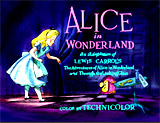




Alice in Wonderland (1951), 75 minutes, D: Disney Studio
Disney's animated musical classic (based upon Lewis Carroll's 1865 tale Alice's Adventures in Wonderland) told about a madcap world known as Wonderland where young Alice ventured during a fanciful dream sequence. In the film's opening set in England's Victorian era, young and immature Alice (voice of Kathryn Beaumont) was resting by a flowery river bank while listening to her older sister (voice of Heather Angel) read a "history lesson" from a boring book. Her mind drifted to fanciful thoughts about her own private Wonderland world. Alice caught a glimpse of a White Rabbit (voice of Bill Thompson), with a waistcoat and a large pocket watch, racing by and singing "I'm Late." Alice and Dinah followed the rabbit to a hole, where she tumbled downward into a dark tunnel. At the bottom of the hole, Alice pursued the Rabbit through a series of increasingly-smaller doors into a larger room, where she encountered a talking Doorknob. Inside a bottle and on a sea of her own tears, Alice floated and navigated through the Doorknob's keyhole (mouth) and brought her to dry land. She watched a Dodo Bird (voice of Bill Thompson), dressed like a sea captain, and other animals in a "jolly caucus race." She also encountered the fanciful and very fat twin brothers Tweedle Dum and Tweedle Dee (voice of J. Pat O'Malley) who halted her chase, and danced as they recited the short narrative poem of "The Walrus and the Carpenter." She experienced many things in different locations - at the Rabbit's house, in a flowerbed with Talking Flowers in a flower-bed and other strange insects, and then she spoke to a blue Caterpillar (voice of Richard Haydn), smoking a hookah and singing: "A-E-I-O-U (The Caterpillar Song)" while exhaling smoke in the shapes of vowels. Alice's next encounter was with a grinning, mischievous Cheshire Cat (voice of Sterling Holloway) with purple stripes that faded in and out. In a garden, she came upon a fancy tea table covered with steaming and tooting teapots during the celebration of a wacky "Unbirthday" tea party. The celebration was attended by the Mad Hatter (voice of Ed Wynn), a very confused March Hare (voice of Jerry Colonna), and a small Dormouse (voice of James MacDonald). After becoming lost in the dark Tulgey Wood forest, she was saved when directed by the Cheshire Cat on how to escape through a short-cut, emerging in the high hedge maze garden of the Queen (and King) of Hearts, where she met a jolly group of Playing Cards (known as The Mellomen) painting white roses red. The Queen was incensed that her roses had been sloppily painted red in the royal flower garden and she had three Playing Cards dragged away as she bellowed: "Off With Their Heads!" Following a strange game of croquet, the Queen lost her temper and blamed Alice - while constantly bellowing "Off with her head!" She urged Alice to be executed immediately, but the King suggested a trial. Witnesses were called, including her friends at the tea party, but she was poorly defended until the Cheshire Cat reappeared and disrupted the trial proceedings. The film ended with a chase through the garden maze. Alice ran off and returned to the Doorknob room, where she looked through the keyhole and saw herself sleeping by the riverbank. She was awakened (and saved from the mob chasing after her) by her sister's voice calling out: "Alice, wake up! Please wake up, Alice!" They returned home in time for afternoon tea.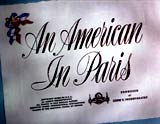


An American in Paris (1951), 102 minutes, D: Vincente Minnelli
This great MGM 1950s screen musical and a Best Picture-winner was colorfully enhanced by the grace and athleticism of Gene Kelly and direction by Vincente Minnelli. It featured sumptuous sets, charming dance sequences, George and Ira Gershwin's memorable melodies, and a 13-minute, avant-garde ballet choreographed by Kelly - with backdrops representing various impressionistic artists. Jerry Mulligan (Gene Kelly), a young American G.I., lingered in Paris after World War II to study art and painting. He wanted to live the life of the great painters -- in a Montmartre garret, starving for his art. One of Jerry's "very good friends in Paris" was aspiring American concert pianist Adam Cook (Oscar Levant), who was also studying abroad. Adam used to work as an accompanist fifteen years earlier for successful music-hall star entertainer Henri Baurel (Georges Guetary in his only American film appearance). In a neighboring bistro, Henri showed Adam a picture of his 19 year old girlfriend/fiancee Lise Bouvier (young French teen, actress/dancer Leslie Caron in her screen debut), a beautiful dancer who worked in a French perfume shop. He had rescued her from the Nazis years earlier when her father was a Resistance leader and she was orphaned. Henri raised her in his own home, and grew to love her after she blossomed into womanhood. While Jerry was having difficulty selling his paintings, rich, romance-minded American gallery owner and patroness Milo Roberts (Nina Foch) offered to support and sponsor him, and he agreed -- even if the bargain meant joining the benefactress' entourage of lovers. In a chance encounter in a Montmartre nightclub where Jerry was with Milo, he spotted Lise, a young, exquisite French mademoiselle, and instantly fell in love. He persistently pursued her, and was able to acquire a date with her, although she was reluctant. Jerry shared a romantic song/dance with the pretty French perfume-shop clerk Lise on the quay next to the bank of the Seine River to "Our Love is Here to Stay." Unfortunately, although she was attracted to Jerry, she was already engaged to marry her older benefactor Henri Baurel. The film's most extravagant number was the closing audacious 13-minute symphonic "American in Paris" ballet with lavish, colorful and impressionistic backdrops, fountains and artistic settings based on the works of famous and celebrated French painters (Dufy, Utrillo, Renoir, Van Gogh, Rousseau, and Toulouse-Lautrec). Jerry pursued Lise through the continually-changing backdrop of Paris, as their romance experienced many ups and downs. It began with Jerry in front of a black and white backdrop picking up a red rose dropped by Lise. The next sequence was in a Madeleine flower market where Jerry danced with GIs and gendarmes, and also with straw-hatted hoofers. Then came a passionate emotional, mating dance (during a smoky night) between Jerry and Lise around a fountain in the Place de la Concorde followed by a Moulin Rouge-styled jazzy dance in a cafe. The number ended with everything suddenly vanishing and the crowd disappearing. Jerry found himself alone with his red rose in front of the black and white sketch backdrop in a deserted Paris - with a zoom closeup of the red rose in his hand. The rose dissolved into his lovelorn, romantically desolate face. In the concluding happy reconciliation - from a balcony, Jerry saw Lise giving Henri a short, grateful farewell kiss after which Henri gracefully released her from her engagement and stepped aside when he discovered that she cared for someone else. Lise ran up a long flight of stairs into Jerry's arms, ecstatically reunited in a loving embrace. The camera panned upwards to a twinkling Paris skyline, as the young couple found love together.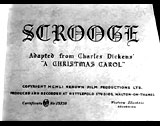



A Christmas Carol (1951) (aka Scrooge, UK), 86 minutes, D: Brian Desmond Hurst
This black and white classic from director Brian Desmond Hurst has been considered the most definitive and faithful film ever made about miserly Ebenezer Scrooge. Scrooge (or A Christmas Carol) was based on writer Charles Dickens' 1843 novella, A Christmas Carol in Prose, Being a Ghost Story of Christmas (aka A Christmas Carol). The mean, white-haired Ebenezer Scrooge, known for his trademark phrase: "Bah, humbug!" was authentically portrayed by Alastair Sim. The film opened at the London business exchange in the mid-1800s, where Scrooge demonstrated his obvious distaste for the festive season and holiday. The wealthy Scrooge wouldn't give to charitable causes for the poor, destitute, unfortunate and needy ("l wish to be left alone"). He also refused a Christmas dinner invitation from his good-natured, cheerful nephew Fred (Brian Worth). Scrooge begrudgingly allowed his own underpaid, humble clerk Bob Cratchit (Mervyn Johns) with lame son Tiny Tim (Glyn Dearman) to have Christmas day off for a family celebration, although he called it an "inconvenience." Once he returned alone to his empty mansion (with his door knocker reflecting the face of a ghost), suddenly, his door swung open to a ghost - his long-deceased former partner Jacob Marley (Michael Hordern) from seven years before who was dragging heavy chains. After Scrooge cowered and admitted his belief in the suffering and tormented Marley, his former partner explained his wandering and tortured spirit.The shackled Marley warned that Scrooge still had a chance of escaping the same fate, with the visits of three ghosts that would begin at 1 am. A procession of three ghosts or spirits appeared who all advised the embittered Scrooge to repent of his greedy ways, and redeem himself. Each of the ghosts showed Scrooge the parts of his life that he had forgotten or ignored, and urged him to discover and adopt the true spirit of Christmas: - the Ghost of Christmas Past (Michael J. Dolan), a white Grecian-robed, long gray-haired gentleman - the Spirit of Christmas Present (Francis de Wolff) and - the Spirit of Christmas Yet to Come (C. Konarski), a black-garbed, horrific figure. With the Ghost of Christmas Past, Scrooge revisited his idealistic youth and saw himself (George Cole) in an earlier time. He watched as he met with his beloved sister Fan Scrooge (Carol Marsh), but later was heartbroken when he saw her die while giving birth to nephew Fred - someone Scrooge would resent, although Fan had graciously asked him to care for her orphaned boy. The segment entered a party at the Fezziwig household, where the younger Scrooge proposed to his fiancee Alice (Rona Anderson), but soon, their future marriage was not meant to be due to drastic changes in Scrooge's personality. Scrooge was apprenticed to a benevolent employer Mr. Fezziwig (Roddy Hughes), but he was lured (and corrupted) by a rival - mentor Mr. Jorkin (Jack Warner) to leave his employment. As Scrooge prospered, he manifested the first signs of tyrannical greed after Fezziwig was subsequently run out of business, and a new company emerged - the Amalgamated Mercantile Society. Alice returned her engagement ring to Scrooge, telling him that his pursuit of wealth and world-view had completely changed him. When the company faced scandal (Jorkin was accused of both bankruptcy and embezzlement), Ebenezer and his long-time colleague - accountant/clerk, John Marley (Patrick MacNee), who were "not facing prosecution for the capital offense," offered to take over 51% of the company's shares (majority control), and in return, save the company by keeping the scandal quiet. Later, Scrooge offered no pity when notified that his co-partner Marley was dying. He remained at work until 7 pm and only then, after-hours on Christmas Eve, visited the dying Marley. He ignored Marley's last words of advice on his deathbed that Scrooge should save himself. Scrooge was reprimanded by the Ghost (in voice-over) for his lack of caring for Jacob Marley. During the second visitation by the Spirit of Christmas Present, Scrooge was told to observe the hearts of people with good will. Scrooge looked in on the happy Christmas celebrations of lowly miners, then his nephew Fred and the Cratchits. He saw that his spurned ex-fiancee Alice was now a nurse charitably caring for the sick and poor. The Ghost of Christmas Present also presented Scrooge with a grim view of a young boy and girl at his feet, representing Ignorance and Want in the world: ("They cling to me for protection from their fetters. This boy is lgnorance. This girl is Want"). During the final visitation by the Spirit of Christmas Yet to Come (or the Future), Scrooge was most fearful of this last dark-shrouded spectre (looking like the Grim Reaper). He was shown that at the Cratchit house, Tiny Tim had died and was deeply mourned and lamented, especially by his father Bob Cratchit. By contrast, Scrooge watched three poor characters pawning off some of Scrooge's possessions the day after his death with dealer Old Joe (Miles Malleson): an undertaker (Ernest Thesiger), a laundress (Louise Hampton), and a char lady - his maid Mrs. Dilber (Kathleen Harrison). Scrooge was aghast as he saw his things pawned off and sold after his own death. He also attended his own funeral, where he heard wealthy businessmen talking about how no one would attend (unless lunch was served). At the cemetery, Scrooge pondered and then horrifically saw his own engraved tombstone in the cemetery. He pleaded with the Ghost: "Tell me l'm not already dead....I'm not the man I was! Why show me all this if l'm beyond all hope? Oh, pity me, Spirit, pity me! And help me!" He asked for repentance. On Christmas morning after awakening from his frightful dreams, Scrooge seemed crazed, giddy (as a drunken man) and wild-haired. He tried to reassure his screaming and hysterical maid Mrs. Dilber who fled from him down the stairs, that he was still himself: "Please, Mrs. Dilber. I am not mad. Even if I do this!" He gave her a guinea coin as a Christmas present, raised her pay from two to ten shillings a week, and gave her the day off. Feeling redeemed, Scrooge went to a window and sent a boy (with the promise of a shilling) to purchase a turkey at the local butcher's shop, to be anonymously delivered to the Cratchits' home. (The Cratchit family reacted in astonishment, thinking Scrooge had taken leave of his senses. Scrooge then called on his nephew Fred at his house and asked for forgiveness for refusing to dine with him earlier. He also asked forgiveness from Fred's wife (Olga Edwardes). And then he danced a lively polka with her. The next day at work, Cratchit arrived late and feared being fired as he meekly approached Scrooge in his office. However, Scrooge laughed uncontrollably as he happily raised Bob Cratchit's salary, and promised to help him raise his family. Then he added (as he mumbled and cackled to himself): "I don't deserve to be so happy! But I can't help it. I just can't help it." The narrator (Peter Bull, in voice-over) concluded the film with laudatory comments about Scrooge, as he ran to meet up with Tiny Tim - now running without crutches: "Scrooge was better than his word. He became as good a friend, as good a master, and as good a man as the good old city ever knew, or any other good old city, town, or borough, in the good old world. And to Tiny Tim, who lived and got well again, he became a second father...And it was always said that he knew how to keep Christmas well, if any man alive possessed the knowledge. May that be truly said of us, and all of us. And so, as Tiny Tim observed, 'God Bless Us - Everyone.'"

The Day the Earth Stood Still (1951), 92 minutes, D: Robert Wise
Robert Wise's seminal, big budget science-fiction film - based on Edmund H. North's adaptation of the short story "Farewell to the Master" by Harry Bates, was a cautionary tale that not only examined wider issues of politics and society, but also human emotions and frailties. Much like the "drive in movies" of the 1950's, such as The War of the Worlds (1953), Forbidden Planet (1956), and Invasion of the Body Snatchers (1956), this influential, fantasy sci-fi film featured state-of-the-art visual effects and salient social commentary on the Cold War and warfare, and a memorable score by Bernard Herrmann. In the film's intriguing title sequence, an extra-terrestrial vessel approached into the Earth's atmosphere, emphasized by the electronic sounds of theremin theme music; a flying saucer-spaceship landed on the Ellipse (People's Park) in Washington DC in 1951 - causing a panic and US Army troop deployment. A humanoid, benevolent, pacifist, interplanetary alien emissary-visitor named Klaatu (Michael Rennie) emerged from the space-craft. He walked down a ramp, held out his hand, and announced that he brought a message of good-will and peace. But when he pulled out a device or object from inside his spacesuit (later described as a gift to the US President), an edgy soldier fired his weapon, and the device was shattered in pieces and seen lying on the ground next to the wounded Klaatu. Suddenly, through the hatch of the vessel-ship emerged Klaatu's silent, killer bodyguard - a giant robot named (Gort). He descended the ramp from the ship and confronted the military force. With his ability, when threatened, to zap (vaporize or melt) the soldiers' weapons, tanks and giant guns, he deployed a lethal, disintegration, death-ray laser beam heat-ray behind his sliding visor, and quickly disintegrated them, but then was ordered to desist by Klaatu. The robot, an interstellar guardian - a member of a police force, also had the power to destroy worlds such as Earth, if its inhabitants were intent on destruction, aggression, and hostility. Afterwards, Klaatu was hospitalized at Walter Reed for surgery to remove the bullet, and also healed himself with a salve. He escaped and went into hiding posing as an Earthling named 'Carpenter' while residing with a human family (single mother/WWII war widow Helen Benson (Patricia Neal) and her 10 year-old son Bobby (Billy Gray)) and others in a boarding house, in order to observe the Earthlings' lives. Klaatu was led on a tour of Washington DC by Bobby, including a visit to Arlington Cemetery (and the grave of Bobby's father, who was killed at Anzio) - Klaatu was amazed: ("Did all those people die in wars?"). Klaatu was impressed with the Lincoln Memorial (and its inscribed Gettysburg Address). Klaatu was able to eventually met with Bobby's recommendation for "the smartest man in the world" -- the Einstein-like scientist character Dr. Barnhardt (Sam Jaffe). The Professor was told that other alien peoples threatened to completely eliminate Earth (after its development of atomic power) if they didn't seek peace and heed his message by gathering all of the scientists (and politicians) together to learn of his warning. Gort demonstrated his power over the industrial complex, by shutting down the world's power supply for 30 minutes at noon (hence, the film's title "The Day the Earth Stood Still"). Later, Helen Benson was menaced outside the spaceship by the shadowy approach of Gort, after the robot sensed that Klaatu had been shot and killed by military troops. To save herself, she delivered a command of three words given to her by Klaatu - in the event that he was ever harmed - "Klaatu barada nikto" - to prevent the menacing Gort looming above her from killing her and destroying the planet. Afterwards, the robot carried Helen in his arms into the spaceship. The film ended with a soft-spoken final scene, when the resurrected extra-terrestrial Klaatu delivered a pro-disarmament address to scientists and other top leaders of Earth's governments gathered together as his audience outdoors - he lectured and warned world leaders with a final challenge and proclamation, as robot Gort stood behind him near the entrance to their spaceship: ("...but if you threaten to extend your violence, this Earth of yours will be reduced to a burned-out cinder. Your choice is simple. Join us and live in peace or pursue your present course and face obliteration. We shall be waiting for your answer. The decision rests with you"). Gort re-entered the spacecraft, and then, after gesturing goodbye with an extended arm to Helen, Klaatu also entered the spaceship before the craft glowed in preparation for departure; it caused panic among the attendees who retreated to the inside of the enclosed perimeter for safety; the humming saucer rose up vertically and quickly sped off into the night sky.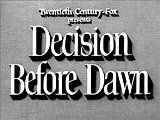

Decision Before Dawn (1951), 119 minutes, D: Anatole Litvak
Director Anatole Litvak's mostly-forgotten, Best Picture-nominated, suspenseful war film and spy-drama contained themes of patriotic loyalty and treason. Shot on location, it was set at the end of WWII in late 1944, when the US' dubious military strategy to facilitate the end of the war with the Third Reich was to recruit recently-captured, volunteer German POWs to provide information about German military troop movements. In the film's opening, the Narrator (voice-over) asked: "Why does a spy risk his life - for what possible reasons? If the spy wins, he's ignored. If he loses, he's shot." US Colonel Devlin (Gary Merrill) was given permission by Army Command to recruit volunteer German POWs, to serve as traitorous espionage, double-agent spies, as Devlin explained: "These men, I believe, if properly trained and used, can help save American lives." Ultimately, two possibly undependable German soldiers - cynical ex-con, former circus tiger trainer, past Panzer factory employee, and petty thief Sgt. Rudolf Barth (Hans Christian Blech) - code-named "Tiger," and idealistic, peace-loving medic Corporal Karl Maurer (Oskar Werner) - code-named "Happy," volunteered to work for the US military even though they knew the personal risks (Maurer: "I believe fighting against them (his own people) now is fighting for them") and Maurer believed his efforts could shorten the war. They were deployed to work with untrusting, sneering, German-hating radio-operator Lieut. Dick Rennick (Richard Basehart) after being rigorously trained in fighting techniques (shooting, parachuting, etc.) by coordinator Monique (Dominique Blanchar). The two German POWs, in a no-win situation, would be risking their own lives by becoming traitorous German deserters sent behind enemy lines. They were to convene at a safehouse in Mannheim, Germany behind enemy lines, following a five-day "tourist mission" to determine whether German General Jaeger, commanding the Fourth Corps along the east bank of the Rhine, was actually considering surrender and wholesale defection. Rennick was paired with "Tiger" (who was born and raised in Mannheim) while "Happy" (taking the assumed name of Corp. Karl Steiner) was assigned the related task of locating the 11th Panzer Corps near Munich, which could move in to reinforce General Jaeger's troops if he actually surrendered. The threesome parachuted out of the same plane into Germany but split up on their way to the safehouse. "Happy" proceeded by bus to Munich and train to Nuremberg to discover the location of the powerful German armored unit known as the Panzers, but just missed them. Becoming slightly nervous about being detected and targeted, "Happy" was quickly befriended on the train by chubby German soldier Heinz Scholtz (Wilfried Seyfert), who despicably offered to exchange confiscated gold jewelry from Jewish Holocaust victims for "Happy's" paper banknotes; he then identified himself as a Waffen-SS motorcycle messenger-courier. On a streetcar, "Happy" was embarrassed when recognized by Paula Schneider (Helene Thimig) who had worked in the past for his surgeon father in Berlin as the clinic's head nurse. She told him that his father was now working at the Wurzburg base hospital. He was also dismayed to hear that the Panzer Corps had moved on two days earlier to Crailsheim. At a checkpoint during questioning about his unstamped papers, "Happy" was saved and reacquainted with Scholtz, who whisked him away to a forbidden black-market inn near Crailsheim, where he met and danced with a "hostess" (hooker) and saddened, self-hating war widow named Hilde (Hildegarde Neff). Later in the evening in his room after she admitted that she was "dirty, miserable and alone," he romantically rejected her. However, she warned him that Scholtz was suspicious of him: ("All I know is they're after you"). As time was diminishing in his mission, "Happy" was pulled aside due to his medic background, to provide medical attention to Oberst (Colonel) von Ecker (O.E. Hasse) in his castle headquarters, who was ailing from a heart condition. He saved the ruthless commander's life when he suffered an attack, and was able to accidentally learn the location of the Panzer Corps (he spotted a detailed map on the Colonel's desk); "Happy" was rewarded by being taken to the front at Heidelberg on an open transport, but everyone was ordered to leave the truck and cross on foot due to a destroyed bridge. During the chaos of an Allied air strike, Gestapo SS officer Corp. Ernst Brandenbacher (Arno Assmann) (who had been tipped off by Scholtz) made an attempt on "Happy's" life by shooting at him: ("You won't get away, Steiner. By now, they know all about you everywhere. We could have taken you a long time ago, but I hoped that you would lead me to the others. I hoped to get all of you"); "Happy" shot back, killed Brandenbacher, and narrowly escaped, although he realized he was on a dreaded security list of deserters/spies. He proceeded back to the heavily-bombed city of Mannheim, and after a tense flight from suspicious authorities, he met up with "Tiger" and Lieut. Rennick to share his findings, but his report about the Panzers was unable to be communicated further due to a damaged radio. The group heard a presumably 'faked' report that gravely-wounded General Jaeger had been put under S.S. guard in a Heidelberg hospital - and therefore could not surrender. And German troop movements suggested that the US could fall into a trap. Rennick, "Happy" and "Tiger" were faced with a treacherous return to Armentières, France (by swimming across the icy cold Rhine River to the American-held side). Once they arrived at the apartment of "Tiger's" sister-in-law, "Tiger" announced he would not attempt to return to France: "When it's all over, our own people will spit in our faces. And you? You will say thank you and fly home." At the river-bank, Rennick was forced to shoot "Tiger" to silence him when he attempted to get away. During their panicky efforts to save themselves, Rennick and "Happy" made it across the river to an island, where "Happy" decided to bravely sacrifice himself and allow himself to be captured in order to allow Rennick to safely escape. Rennick returned with "Happy's" crucial troop information, while regretfully realizing that his compatriot would probably be tortured and shot as a traitor/spy. In the film's final frame, the Narrator (voice-over) described Rennick's reaction to "Happy's" death: "A man stays alive as long as he's remembered, and is killed only by forgetfulness. So long, Happy. Let your real name remain unknown, but let the memory of your sacrifice serve as a key to the meanings of treason. It was to me."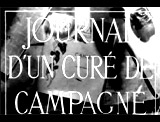
Diary of a Country Priest (1951, Fr.) (aka Journal D'un Curé de Campagne), 95/115 minutes, D: Robert Bresson
Director Robert Bresson's first substantial film (although his fourth) was based upon Georges Bernanos' 1936 novel of the same title. The challenging story, filmed in soft-focus black and white, was a depressing and sad tale of alienation and the struggle to keep one's faith in a world of pain and suffering. In the story, a naive, idealistic, physically-weak, and sickly young priest - the Curé d'Ambricourt (Claude Laydu) in poor health (and on an ascetic diet of stale dried bread and cheap wine) was assigned to work in the rural village of Ambricourt - it would be his first parish. The film's opening showed the serious-minded Priest writing in his personal journal-diary, beginning with: "I don't think I'm doing anything wrong in writing down daily, with absolute frankness, the simplest and most insignificant secrets of a life actually lacking any trace of mystery." He arrived at the job via bicycle, where he gradually began to receive cruel ridicule and complaints from one of the elderly parishioners, and a general lack of acceptance by most townsfolk of his suffering, Christ-like life. When he asked his superior the Curé de Torcy (Andre Guibert) for support and advice, the Priest was told to not desire to be accepted in the community: ("Besides exterminating the Devil, your other dream is to be loved for who you are. A true priest is never loved. The church doesn't care a whit whether you're loved, my son. Be respected, obeyed"). In town was the lavish gated chateau-manor of the town's wealthiest and most influential citizen known as the Count/Le Comte (Jean Riveyre); Count Ferrant's bereft and troubled Countess wife (Rachel Bérendt) remained grief-stricken at the death of her young son, and thus blamed and hated God for the loss. During a confessional, it was revealed to the Priest by the Count's sad, manipulative, possibly-suicidal teen daughter Chantal (Nicole Ladmiral) that her adulterous father was having an affair with the governess; the manipulative Chantal were bitterly angry and hateful of both her father and mother - for her father's affair ("I no longer respect him"), and for her unhappy mother's tacit condoning of the relationship ("She's a fool and a coward"). The Priest felt compelled to counsel the embittered Countess who blamed and hated God for the loss of her boy, and for letting her husband's adultery continue; he taunted her: "God will break you," but she responded: "He has broken me already." However, after a lengthy and serious conversation with the Countess, the Priest helped her to accept her situation, and aided her in restoring her spiritual communion with God - it was his one success in town. The Priest brought the Countess toward absolution and spirituality, and the Countess admitted via a letter to him he received the next day that she had attained peace: "I'm not resigned, I'm happy. I desire nothing." Shortly later, he learned that the Countess was found deceased. A few days later, Chantal confronted the Priest, and announced she had forced the Governess to pack up and leave; the Count also criticized the Priest for meddling ("You have been unwillingly, or at least unknowingly, the cause of a great misfortune...Your character and your habits are a danger to the parish"). Chantal also charged the Priest with harshly bullying and tormenting her mother to her death: ("She claims her mother fought you to the last, and that you left her upset and spiritually distraught"). Apparently, Chantal had secretly listened to their pivotal conversation and misinterpreted it. However, the Priest confusedly refused to defend himself by showing the Countess' letter to those questioning him. He even allowed Chantal to call him a "drunkard" and promote her father's wish to have him transferred away. As the tormented Priest's health condition deteriorated and he was vomiting blood (and at one point he fell face foward into the mud and couldn't move), and he descended further into his own spiritual doubts, he traveled by train to Lillie where he was diagnosed with stomach cancer by Dr. Lavigne. In the film's conclusion, the Priest's expected death in the dingy apartment of Priest Dufrety (Bernard Hubrenne), an ex-seminary colleague and friend, was described in a typed letter (read in voice-over) sent by Dufrety to Torcy. The Priest had succumbed alone in "great anguish" (spitting up blood and sweating profusely), while calmly accepting his fate and absolution ("His face grew calm. He even smiled") - with his last words: "What does it matter? All is grace." The letter ended: "I believe he died just then."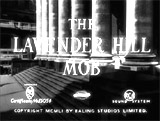



The Lavender Hill Mob (1951, UK), 81 minutes, D: Charles Crichton
Charles Crichton's Ealing Studios' crime-caper comedy concluded with the unlikely pursuit of English schoolgirls to retrieve six golden miniature Eiffel Towers - it was one of four Ealing Studio's comedies at mid-century, including Kind Hearts and Coronets (1949), The Man in the White Suit (1951), and The Ladykillers (1955). It won the Oscar for Best Writing, Story and Screenplay (T.E.B. Clarke). In the opening sequence, prim, mousy and timid bank clerk Henry Holland (Oscar-nominated Alec Guinness) was dining in a fancy restaurant in Rio de Janiero next to a pipe-smoking British gentleman, where he met Chiquita (Audrey Hepburn in her screen debut, with a very short walk-on role) and gave her money for a birthday present. Holland expressed pleasure at having had a superb year, and then he flashbacked to his work in the Bank of England with 20 years of service in the transport and shipment of gold bullion ingots from a refinery to the bank. In a continuing flashback, he mused in voice-over about his poorly paid job - and how he might finally become rich. His solution to his impoverished life was to commit the "perfect" crime, by stealing gold bullion from the shipments and melting down the gold bars - he met up with his potential cohort-in-crime Alfred Pendlebury (Stanley Holloway), an artist in his Balmoral-Lavender Hill boarding house. The eccentric Alfred operated a foundry that could convert over £1 million pounds of gold into souvenir Eiffel Tower paperweights to be exported (smuggled) out of the country to France from England without detection. Pendlebury was the perfect partner, since he could utilize his current Eiffel Tower paperweight molds (for standard leaden souvenir statues), and ship the disguised golden paperweights (painted black) to his Paris distribution network. They recruited two other petty Cockney crooks to aid in the robbery scheme: Lackery Wood (Sidney James) and Shorty Fisher (Alfie Bass). Holland and Pendlebury traveled across the English Channel to supervise the transport of the golden statues to a gift shop located at the top of the Eiffel Tower. To their horror, they realized that a souvenir shopkeeper at the Parisian kiosk (on the upper level of the Eiffel Tower) had sold six of the gold-converted Eiffel Tower statues from a crate specially-marked R that she wasn't supposed to open. Holland rushed to the elevator to watch as a group of British schoolgirls, who had accidentally bought six of the statues, descended in the Tower elevator. In a riotous sequence, Holland and Pendlebury chased after them down a dizzying, Vertigo-inspired, winding circular staircase, to try to reach the ground level before the elevator did. There was a zany wild goose chase sequence after the British schoolgirls from Paris to London, and although five statues were recovered and bought back, the 6th one ended up at London's Hendon Police Training College in a display of police history. Holland grabbed the statue, instigating another crazy and confused, mad-cap police pursuit in squad cars after the bullion robbers. Holland humorously broadcast false directional radioed reports from a stolen police car. In the concluding surprise revelation, Holland revealed that he had escaped to Rio de Janeiro with the six statues worth 25,000 pounds, and enjoyed his new lifestyle for one year until the money ran out: ("I came straight on to Rio de Janeiro - 'Gay spritely land of mirth and social ease'... Enough to keep me for one year in the style to which I was, ah, unaccustomed"). But then as he left the restaurant in the film's major plot twist, his left hand was shown handcuffed during the telling of his entire flashbacked story to his British dining partner - a police officer.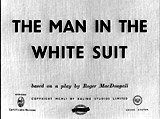



The Man in the White Suit (1951, UK), 85 minutes, D: Alexander Mackendrick
Director and co-writer Alexander Mackendrick's post-war Ealing Studios satirical comedy about capitalism was one of many similar films at the time that featured actor Alec Guinness. In the plot (with elements of sci-fi) told in a flashback, oddball, idealistic, brilliant-minded inventor and often-fired 'mad scientist' chemist Sidney "Sid" Stratton (Alec Guinness) was employed as a lowly, menial worker at a Wellsborough textile factory in Northern England. Stratton was using the firm's research laboratories to obsessively and surreptitiously perform his own experiments, with equipment consisting of long tubes of gurgling liquids (one of the film's continuing auditory themes). When found to be using the equipment and facilities unauthorized, he resigned before being fired by irate mill owner Michael Corland (Michael Gough). Corland was engaged to marry Daphne Birnley (Joan Greenwood), the rebellious daughter of a rival textile mill owner. He found a way to pose as a worker at Birnley Mills, a rival mill owned by wealthy Alan Birnley (Cecil Parker). Likewise in their laboratories with their expensive equipment and supplies (valued at 8,000 pounds), Stratton was experimenting on an invention "to astound the world" - a revolutionary, 'long-chain molecule' textile product. He ran out of the lab, screaming: "I've done it! I've done it!", but he was initially regarded as a "lunatic" until Daphne was inspired to speak to her father about the worthiness of his findings. Daphne announced to her father: "He's made a new kind of cloth. It never gets dirty, and it lasts forever." At first, the free-thinking Stratton's scientific discovery and further exclusive research was embraced and financed by Birnley. However, there were strong doubts about Stratton's "tomfoolery" in the lab after multiple explosions in the building led to extensive damage and bills of over 20,000 pounds. The experiments eventually led to success - Stratton was able to create a new fabric that could serve as a substitute for wool, cotton, or linen. One problem was that the new unbreakable textile repelled dye just as it did dirt, so a method to color the fabric would have to be devised. The film's title referred to the brilliant-white, slightly-luminous suit that Stratton constructed for himself with the miraculous material (including radioactive thorium); Daphne dubbed him: "A knight in shining armor." She was inspired by Sidney's indestructible cloth fiber invention and took his side as a crusader for progress. At first, textile mogul Birnley was enthusiastic although he also admitted the product would be disastrous and engender chaos and disruption; doubts were also expressed about how the revolutionary fabric would directly compete with textile factory owners (and the workers) and their businesses, who would lose everything. During a closed-door business meeting between Stratton and the major mill owners, they announced that they had decided to pay him off to monopolize his product and work; they reasoned that if they didn't assume full control, it was feared that the new textile "might upset the delicate balance of the market," or might be sold to a competitor that could ruin them. There were efforts to pressure Stratton to give up complete control of his product/idea by paying him a quarter of a million pounds. Stratton refused, and after being physically restrained, he had to fight his way out of the room to escape. The business group decided to use Stratton's attractive friend Daphne Birnley to pressure him to sell the "world rights" to his new discovery. They tried to persuade her to help them convince Stratton to give up his idea, and she bargained for a payment of 5,000 pounds to do their bidding. The enticing Daphne spoke to Stratton and confided that she would escape with him from the mill-town if he would take the owners' lucrative offer. Even after kissing him, he refused, and she was relieved that he didn't give in. She suggested helping him to publicize the entire truth about the story surrounding the product. In the film's astounding conclusion, Stratton (wearing his glowing white suit) was chased by a mob (of mill owners joined with striking workers, or CAPITAL and LABOR) that pursued him through night-time streets, to curb his invention. Unexpectedly, the material used to construct his suit was found to be unstable. The threads began to deteriorate like tissue paper and tore apart. Sidney realized he must surrender and he stopped fleeing - he was surrounded by members of the street mob (mill owner managers and trade union mill worker employees) as they ripped the suit from Sidney's body, leaving him only in his underwear, shirt and tie as they laughed and screamed: "It doesn't work! It's coming to pieces! We're saved!" In the film's final moments, Sidney had again been fired. On the street outside Birnley Mills, he had an a-ha revelatory moment ("I see") and realized how he could fix his polymer fabric, and hurriedly walked off. With a knowing grin, he realized how he could improve his formulaic creation - he would undoubtedly begin again after discovering the flaw in his original textile invention.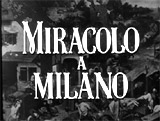


Miracle in Milan (1951, It.) (aka Miracolo a Milano), 100 minutes, D: Vittorio De Sica
Director/producer Vittorio De Sica's brilliant, quirky, surreal comic fantasy won the Grand Prize at the Cannes Film Festival. It was an uncharacteristic film for the director who was one of the pioneers of Italian social realism. The playful, light-hearted and fanciful story (introduced with the storybook's "Once upon a time...") was a neo-realistic, feel-good fable based upon co-scriptwriter Cesare Zavattini's children's book l Totò il Buono. Tender-hearted elderly spinster Lolotta (Emma Gramatica) found an abandoned baby among the cabbages in her garden patch in post-war Milan (Italy). She adopted the baby, cared for him with love and shelter, and named him Totò (Gianni Branduani as 11 year-old child). She was a cheerful old woman who loved life: "What a great big place the world is." When she died and after her funeral (Toto was the only attendee), he was sent to an orphanage and remained there for many years until released. When Totò (Francesco Golisano as adult) entered the world, he was optimistic, kind, innocent-minded, generous and open-hearted. Without belongings or a place to live, he settled with other dispossessed hobos/homeless people - eccentric misfits, vagabonds and squatters in a shantytown camp. The residents of the illegal camp lived in makeshift steel-corrugated boxes and massive cement pipes on a vast, snow-covered barren field outside the city. Totò enthusiastically and energetically engaged and supported the outcasts during their travails, and helped the residents in the small colony or community to work together to reinforce and build stronger shelters. He even supervised the move-in of newly-arrived outcast individuals into new housing units, including a mistreated servant named Edvige (Brunella Bovo) who became his sweetheart. One afternoon, one of many fat-cat land developers in Milan - wealthy land-owner and exploitative, greedy capitalist Mr. Mobbi (Guglielmo Barnabò), visited the squatters on the land, and was intimidated by them. During a Maypole celebration (including a lottery drawing for a chicken), when a hole was dug, water was struck on the settlement land - creating a fountain that turned to a gusher of oil. Scheming squatter Rappi (Paolo Stoppa) divulged the sudden discovery of oil to Mobbi, and conspicuously returned to the homeless camp with a top hat and a fur wrap around his neck. Mobbi sent representatives to announce that he now owned the private property. The squatter camp had to be cleared and everything had to be moved out, including the evicted inhabitants; Mr. Mobbi enforced his orders against the rebellious squatters with a squadron of police with smoke bombs, to force them to surrender. During the crisis, Totò climbed the maypole to give up with a waving white flag, where he was given a magic white dove by the ghostly 'spirit' of his guardian angel and adoptive mother Lolotta. He used its miraculous powers to grant secret wishes that transformed the camp, pushed back the smoke, and caused the police assault with water hoses to be defeated. One of Totò's secret wishes caused two captains of the guard to break out into an aria, when they raised their swords to charge forward with their troops. Totò was able to prevent Mr. Mobbi's guards from advancing, but then the camp residents began begging him for clothing, shoes, food, money, physical attributes, and other material items after he promised them: "Queue up and keep calm. I'll make you all happy, I swear"; the statue (Alba Arnova) in the camp's courtyard also miraculously came to life; however, the two 'angels' that accompanied Lolotta objected to Toto, as a mortal human, using their magical powers to present people with gifts, so they retrieved the magical dove. Toto was able to get it back from his 'mother' - and as he fell in love with Edvige and kissed her - he offered her the sun by glancing at the horizon and causing the sun to rise; however, the two angels again stole back the dove. The camp was left unprotected, and was overrun by the police who now evicted the occupants and jailed them. Edvige handed Totò a replacement ordinary dove through the bars of his police wagon in Piazza del Duomo, the central square outside Milan's Cathedral. With this dove and through the power of his faith, Toto offered a wish - freedom for his friends. His wish was magically granted - police wagons opened their doors and walls, and the squatters flew up into the air on stolen street sweepers' broomsticks; after circling around the Cathedral, Toto (and Edvige) - with many others - departed for a better heavenly place and a positive tomorrow.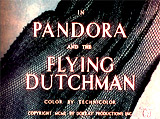




Pandora and the Flying Dutchman (1951, UK), 122 minutes, D: Albert Lewin
Writer/director Albert Lewin's romantic-fantasy drama, suggested by the 17th century Flying Dutchman ghost-ship legend, featured fantastic Technicolored cinematography by Jack Cardiff. A prologue opened the film: "According to the legend, the Flying Dutchman was condemned to wander the seas eternally unless he could find a woman who loved him enough to die for him." In the seaport town (fictitious) of Esperanza on Spain's Mediterranean coast, about 20 years earlier, fishermen dragged up in their nets the corpses of a male and female and a copy of Omar Khayyám's book Rubaiyat. The town's residential archaeologist Geoffrey Fielding (Harold Warrender) and his niece Janet (Sheila Sim) were summoned to the beach from their villa by a pealing bell. Land-speed race-car driver Stephen Cameron (Nigel Patrick) was stunned by the sight of the bodies and was comforted by Janet. The film's flashbacked story was narrated (in voice-over) by Geoffrey as he was struggling to translate a handwritten manuscript written by the legendary Flying Dutchman. He was distracted by a gypsy singing in the nearby tavern of The Two Turtles. The scene shifted back in time to the year 1930 - in a local tavern, a group of British expatriates was introduced, including alluring American femme fatale Pandora Reynolds (Ava Gardner) - a nightclub singer, and two of Pandora's admirers: alcoholic, love-sick, and suicidal Reggie Demarest (Marius Goring), and Stephen Cameron. With dramatic flourish in front of everyone, the self-destructive Reggie poisoned his own drink and fell dead at her feet. He had deliberately killed himself to usher in his "exit" from life. Later, Pandora claimed she was relieved since he had many times threatened to take his life. That same evening, after a thrilling, open-air, cliff-side drive on a winding road in Stephen's prized race-car (named Pandora), Pandora promised to marry him on September 3rd (a reversal of the day's date - the ninth day of the third month), but he first had to prove his love (after he told her: "I would do anything") by pushing his "precious" automobile from a cliff into the sea. He obeyed her ("Do it, Stephen") and destroyed his vehicle. Geoffrey drove up to the couple and expressed how astounded he was by Stephen's "magnificent" declaration of love for Pandora: "The measure of love is what one is willing to give up for it." Pandora had spotted a "strange yacht" anchored in the bay, possibly helmed by the legendary "Flying Dutchman' - she learned from Geoffrey that "the flying dutchman is allowed to land once in seven years to look for the woman who can redeem him (from)...his curse. He's doomed to wander the sea until judgment day as Captain of a ghost ship, unless if he can find a woman who loves him enough to die for it..." Pandora compared Stephen's destructive act of love to the love of the woman the Dutchman was looking for. When they returned to the beachside, the curious Pandora kept eyeing the mysterious yacht in the bay. Drawn to the yacht, she tossed off her clothes onto the beach and swam out to the boat, where she called out for someone to answer. On-board, she found a solitary individual - handsome yet melancholy Dutch sea captain Hendrik van der Zee (James Mason) painting a picture of her as Pandora. He seemed to have anticipated her arrival. He suggested that she could be his muse - "an extraordinary model, who may inspire me to paint in the face and form of Pandora Reynolds, the secret goddess whom all men in their hearts desire." Pandora was retrieved by Geoffrey and Stephen on a boat who were then introduced to the Dutchman. He was invited to have dinner the next evening at Hotel Isabella with the other expatriates. Meanwhile, after meeting a second rival suitor, Pandora regretted the sacrifice she'd required of Stephen, and allowed him to salvage and repair his race-car. The Dutchman moved into a garden cottage at the hotel, and became part of the "circle" of friends with Geoffrey while falling in love with Pandora. A few months later, he helped Geoffrey to translate the contents of a notebook written in the 17th century in Old Dutch by the "doomed man" himself. The legendary "death-ship" story in the manuscript confirmed that the Flying Dutchman tale was being acted out by the sea captain. In the tale expertly visualized in the film, a 16th-century ship captain murdered his unfaithful wife by stabbing her in bed. Then, he cursed and rejected God during his murder trial, but narrowly escaped execution by hanging when the door of his dungeon prison cell was mysteriously opened. Upon returning to his ship anchored in the bay, he experienced a "dreadful dream" that he had wrongly murdered his truly-innocent wife. He momentarily considered committing suicide, and then learned that his unending burden and punishment-curse was to have "immortal life" and eternally roam the open seas with a "ghostly crew" until he found a woman who would sacrifice herself for him. For six months every 7 years, he was allowed to go ashore to search for the elusive female, so that he might learn the meaning of love. A love triangle developed between the many suitors for Pandora's love: her ex-lover - the town's heroic bullfighting matador Juanito Montalvo (Mario Cabré) (the son of a gypsy mother in Esperanza) who lived in Madrid, her fiancee Stephen whom she was preparing to marry in one month, and sea-captain Hendrik. At the same time, Janet (who loved Stephen from afar) accused Pandora of genuinely not loving him, and accused her of being dishonest, deceptive, and treacherous. On the beach at a celebration following Stephen's record-breaking race, Pandora declared her true love for the sea-captain after they kissed, but Hendrik refused to have her die for his sake. He intentionally kept his emotions remote and distant, and attempted to provoke her into not loving him, and she realized he had pushed her away. He retreated to his yacht as she prepared to be married to Stephen. One week before Pandora's marriage, the jealous, violence-prone and infatuated matador Juan forcefully proposed to marry Pandora instead of Stephen, but she refused, with hints that it wouldn't help to eliminate Stephen, because she also loved someone else. In order to possess Pandora - knowing that her heart was set on the Dutch sea-captain, Montalvo approached when Hendrik entered his cabana at the hotel at midnight. He hurled a knife into Hendrik's back to kill him, but didn't realize that the curse prevented Hendrik from dying. Hendrik only told Pandora that someone had killed the little terrier dog she had given him, but she was confused. During his next day's bullfight in the Madrid arena, Montalvo was lethally distracted when Hendrik appeared alive in the stands. He was so stunned that he turned away from the bull and was gored. Before he died, Montalvo confessed to Pandora that he had received "God's punishment" for murdering his romantic rival, but she didn't fully understand. Pandora spoke with Geoffrey on the eve of her wedding to Stephen, expressing how bewildered she was that Hendrik was still alive: ("He was killed and he came back to life"). Geoffrey suggested it was because Montalvo was delirious before he died. To help Pandora understand the "truth" about Hendrik, he offered her the translated manuscript to read by herself, noting: "It's his story. Yours too, in a way." As Hendrik prepared to sail away (the period of his six months' stay was ending), Pandora again decided to swim out to his ship to join him. Both realized that fate and destiny had brought them together again - and that she looked exactly like his murdered wife in the painting and in a portrait. She exclaimed: "When I came here for the first time, we weren't strangers." He concurred: "We were man and wife separated for centuries and meeting again. The moment I saw you, I knew it. You'd come back to me." She agreed: "I think I knew it too." Pandora vowed her dying love for him (and that she was happy and not afraid to die), and they embraced and kissed, thus freeing Hendrik from his immortal curse and inaugurating the start of their timeless and unending love. The film ended with a fiercely destructive storm that sank their ship. The two lovers were found entwined in a net on the beach in each other's arms - the conclusion of the flashback and a return to the film's opening.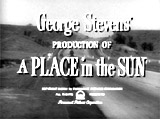


A Place in the Sun (1951), 123 minutes, D: George Stevens
Director George Stevens' star-crossed melodramatic romance (and social drama) was based on Theodore Dreiser's 1925 novel "An American Tragedy." Set in 1950, low-born, ambitious George Eastman (Montgomery Clift) from Chicago hitched a ride to his distant wealthy Uncle Charles Eastman's (Herbert Heyes) place, where he was given an assembly-line bathing-suit factory job. George had left his widowed mother Hannah Eastman (Anne Revere), a religious mission worker in Chicago. As the mostly-ungifted, uneducated, aimless nephew George slowly ascended the ladder of success, the poor boy was entranced and infatuated by the snobbish, beautiful, well-bred rich socialite-debutante Angela Vickers (Elizabeth Taylor) - his own distant cousin - and they fell in starry-eyed love. It was the love of an ideal woman which had now been discovered in her. Against the factory's rules about fraternizing with co-workers, at the same time, he also dated and impregnated poor, lower-class Alice Tripp (Shelley Winters), after which a doctor refused to terminate her shameful and unwanted pregnancy (the term abortion was not used). Using coercive blackmail, she threatened to reveal their relationship and pregnancy if George didn't marry her (to make their child legitimate), and even mentioned committing suicide. On Labor Day weekend at the Vickers' lakeside home during a vacation period, Alice arrived to confront George, and insisted that they go to the county clerk's office to get married - but it was closed for the holiday. During a rowboat ride with Alice on Loon Lake that dark night, George contemplated, planned and willed (if not actually committed) the murder of his fiancee, by overturning the boat and letting her drown. Then, in an ironic twist of fate, when she stood up to comfort and console him, she accidentally fell in the lake when the boat capsized, and she drowned, and he was unable (or unwilling) to save her. George attempted to delay dealing with the fact of Alice's death, but was soon confronted and arrested by authorities. He faced murder charges and went to trial. He intended to murder Alice, but there were no witnesses that he actually did. There was only strong circumstantial evidence against him. The relentless District Attorney R. Frank Marlowe (Raymond Burr, TV's future Perry Mason) devastated George on the stand. He even re-enacted the rowboat death in the courtroom, while George failed to credibly answer questions and help to reconstruct the drowning. The most dramatic courtroom moment came when Marlowe struck the oar across the boat, implying that George had struck Alice and caused her to fall into the water. In the final prison/execution farewell scene in his death cell, condemned and doomed poor boy George was with Angela to say goodbye. Angela told him: "...I'll go on loving you for as long as I live." George replied: "Love me for the time I have left. Then, forget me." They kissed one last time. Angela: "Goodbye, George." She half-turned away and then looked back: "Seems like we always spend the best part of our time just saying goodbye." George took to his death the superimposed image of dark-haired Angela kissing him. Inevitably, George fell from his 'place in the sun' when executed (by the electric chair).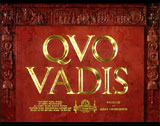


Quo Vadis (1951), 171 minutes, D: Mervyn LeRoy
Director Mervyn LeRoy's and MGM's big budget epic version of Henryk Sienkiewicz's classic 1896 novel about Roman Emperor Nero's Christian persecution starred Deborah Kerr and Robert Taylor, and featured a score by Miklós Rózsa - it was MGM's most expensive film of the time period (with a budget of $7.6 million). There were three other versions of the novel, including two silent historical dramas: Quo Vadis? (1913, It.) and Quo Vadis? (1924, It./Germ.), and Quo Vadis (2001, Poland). The film (with a title translated 'Where are you going?') compressed the historical years of 64–68 CE (combined with other fictional events and characters) to survey the Roman Empire's goal to destroy and persecute followers of the conflicting religion of Christianity. In the summer of 64 AD outside Rome on the Appian Way, 14th Legion Commander General Marcus Vinicius (Robert Taylor) was on his way back to Rome, ruled by tyrannical Nero (Peter Ustinov) after three years of "brilliant victories" on the battlefield. With the aid of his Uncle Gaius Petronius (Leo Genn), one of Nero's most trusted advisors, Marcus was rewarded for his service. After meeting the beautiful Lygia (Deborah Kerr), a truly devout young Christian woman who was the adopted daughter of retired Roman General Plautius (Felix Aylmer), he was able to acquire Lygia as his 'property' although she strenuously objected. When she disappeared, Marcus went undercover to locate her and found her at a secret ritualistic baptism ceremony (attended by other Christians) held in cave ruins after dark outside the city. Although the two expressed their love for each other and he proposed marriage to her, he renounced her when she refused to choose him over her faith. Marcus departed to Antium, the location of one of Nero's coastal palaces, where he was tempted to engage in an affair with matricidal Nero's 'harlot' Empress - the lustful Poppaea (Patricia Laffan). The despotic, petulant, and unhinged tyrant Nero was contemplating the construction of a "new Rome" known as 'Neropolis' (envisioned in a gigantic architectural model to be built in his own image), to replace the current city of Rome. He sent a squadron of soldiers led by General Tigellinus (Ralph Truman) to set fire to the city, and then at Poppaea's urging, he blamed the Christian sect for setting the blaze. Marcus raced back to the city to rescue Lygia and her family. Nero began to arrest and imprison Christians, including Marcus who was seized and ordered to be put "with his Christian friends" - possibly for his part in the rebellion and for slighting Poppaea. Lygia feared that she and other followers were destined to be slaughtered in the Circus by lions - part of Nero's campaign against the Christians. Meanwhile, previous supporters of Nero were beginning to question his insanity and brutality. Petronius ended his life by suicidally having his wrist slit, while he dictated a letter to Nero complaining of the Emperor's desecration of the musical arts with both his lyre and dreadful singing. In the Circus arena before a gigantic crowd of spectators, Christians were being devoured by lions, viewed from the podium by Nero and Poppaea. In their holding cell together, Lygia confessed her love for Marcus (who felt that he had become a Christian), and asked for Apostle Peter (Finlay Currie) to officiate a marriage ceremony between them, before they faced death together. In the film's conclusion, Marcus helped to save Lygia in the arena from a charging bull, and led a successful rebellion against Nero, with the support of his own loyal soldiers. Marcus addressed the spectators, received a "thumbs-up" from everyone but Nero, condemned Nero for his brutalities, and announced that General Galba was marching toward Rome to replace him and "rebuild Rome and bring back justice." Nero's bloody tyrannical reign came to an end - he strangled Poppaea after blaming her for her failed, suggested tactic of scapegoating the Christians, and then was aided in his own suicidal stabbing with a dagger by his embittered, banished slave named Acte (Rosalie Crutchley) ("You've lived like a monster. Now die like an emperor - by your own hand").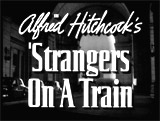


Strangers on a Train (1951), 101 minutes, D: Alfred Hitchcock
This was another of Hitchcock's great suspense thrillers - co-scripted by Raymond Chandler and based on the novel by Patricia Highsmith. During a 'chance' meeting on a train enroute from Washington DC (a cleverly-choreographed sequence in which the two sets of the strangers' shoes were highlighted), rich, psychopathic playboy Bruno Antony (Robert Walker) explained his macabre, morbid theory of the perfect murder - an exchange or swap of murders and victims - to professional champion tennis player Guy Haines (Farley Granger). During their conversation, Bruno learned from Guy's monogrammed lighter (inscribed "From A to G" with two criss-crossed tennis rackets) that Guy was hoping to marry US Senator Morton's (Leo G. Carroll) daughter Anne Morton (Ruth Roman) after divorcing his clinging, stifling estranged wife Miriam (Laura Elliot). Bruno diabolically proposed a bizarre scheme involving motiveless crimes - he would murder Guy's current wife Miriam in exchange for Guy murdering Bruno's spiteful and disapproving wealthy father (Jonathan Hale) so that he could acquire an inheritance, without any trace of clues. Haines quickly dismissed the preposterous and eccentric idea and soon after disembarked from the train in the town of Metcalf, accidentally leaving his lighter behind (later used by Bruno to frame Guy). A further complication was that the promiscuous Miriam was pregnant by another man but refused to allow a divorce. Bruno realized he must carry through on his part of the bargain, and proceeded to stalk Miriam at an amusement park before strangling her. Bruno showed Miriam's thick-lensed eyeglasses to Guy as proof of the killing - with the additional threat of blackmail, and kept pressuring Guy to commit a corresponding murder by presenting him with a map of his father's bedroom, a key to the house and a gun. The film's few great set pieces included the amusement park stalking and murder of Miriam, the cocktail party scene when Bruno playfully demonstrated how to commit a murder (that turned violent), and the cross-cutting between Guy's prolonged tennis match at Forest Hills and the storm-drain, sewer grating scene in Metcalf (where Bruno had accidentally dropped the lighter). Guy was literally playing against the clock in order to stop Bruno from framing him and planting incriminating evidence (the lighter) against him on the amusement park's "Magic Isle" island - the location of Miriam's murder. The finale involved an out-of-control, wildly-spinning merry-go-round carousel at the park where Guy and Bruno struggled, concluding with Bruno being crushed under the debris after it crashed. Guy was finally cleared of the murder when Bruno's dying hand opened up, revealing Guy's lighter, as the Tunnel-of-Love boat-ride proprietor testified that it was Bruno he saw on the night of Miriam's murder.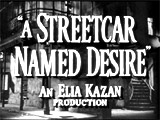


A Streetcar Named Desire (1951), 125 minutes, D: Elia Kazan
Director Elia Kazan's powerful, frank, and brilliant dramatic version of Tennessee Williams' Pulitzer Prize-winning play was based upon Oscar Saul's adaptation. The story, set during the wartime emergency, was about two sisters. First introduced was neurotic, disturbed, alcoholic and sensitive southern belle Blanche DuBois (Oscar-winning Vivien Leigh) who arrived by train in New Orleans. She took a streetcar named "Desire" to the dwelling of her pregnant sister Stella (Oscar-winning Kim Hunter). It was a dingy and cramped apartment (in a run-down building) located in the French Quarter that afforded little privacy. There, Blanche met her brutish, bullying and coarse brother-in-law Stanley Kowalski (Oscar-nominated Marlon Brando) - a sexy, animalistic, earthy and vulgar, muscle-bound and beefy male, who quickly became vicious and annoyed by Blanche's aristocratic affectations and fake refined airs. Blanche admitted that after their father's death, she acquired a high school English teaching job, but was relieved of her employment due to indications of 'insanity' (a vague reference to child molestation). Stanley was incensed when he learned that Blanche had seemingly lost the family home at Belle Reve to foreclosure and creditors, and seemed to either be holding out on the inheritance money fortune, or had spent it all. Blanche met Stanley's best friend/buddy bachelor Mitch (Oscar-winning Karl Malden), who took a romantic interest in the flirtatious Blanche. During one night's poker game, Stanley's volatility exploded and he drunkenly struck Stella. Both Stella and Blanche fled to their friend/landlady Eunice's (Peg Hillias) upstairs apartment for safety. The inarticulate Stanley, wearing a torn and sweaty T-shirt on the street, begged for Stella to come back by bellowing and screaming up to his wife: "Hey Stell lahhhh...," and she returned to him. The pregnant Stella descended on the stairs when Stanley begged for forgiveness from her and they shared a close embrace - with his ear against her swollen body to hear their unborn child's heartbeat. Blanche connived to have Stella leave Stanley for good, but she was irresistibly drawn to Stanley's macho passion for her. Over time, Mitch became uncertain about Blanche's continually-anxious and uncomfortable feelings about her age, and her confession that she drove her first young husband to suicide due to their lack of sexual consummation. Blanche's history of promiscuity and instability slowly began to surface. Stella also learned from Stanley that Blanche had actually been fired from her teaching job for seducing a 17-year-old student. In one telling sequence, Blanche (who was still neurotically grieving) conversed in small talk with a bashful young newspaper boy (Wright King) at the apartment's door, and then seductively offered herself for a maternal kiss. He reminded her of her young husband who had committed suicide after she continually demeaned him, and wanted to subconsciously make up for his death - she seductively offered herself for a maternal kiss. Although Blanche and Mitch often dated and had made plans to marry, Stanley stripped away and ultimately revealed the secrets of Blanche's embarrassing, lurid past. Ultimately, Mitch broke off their engagement even though Blanche piteously begged for forgiveness, after he held her face up to a naked light bulb. Sensing death in the air, Blanche exclaimed: "No, not now!" as a black-shrouded woman selling flowers moved straight toward the front door, incanting: "Flores para los muertos" ("Flowers for the dead"). While Stella was in the hospital delivering her baby, Stanley confronted Blanche in the apartment and condemned her for all of her lies and deceptions (she fantasized that she would be going on a cruise with an older admiring gentleman). In a heavily-censored or edited sequence, Stanley rough-housed with Blanche, and then assaultively 'raped' her (off-screen), causing the destruction of whatever vestiges of her shattered self still remained when she suffered a nervous breakdown. In the film's conclusion, arrangements were made for Blanche to be admitted to a mental institution. A doctor and matron arrived to take Blanche away to an asylum, as she calmly told the elderly doctor: "I've always depended on the kindness of strangers." After Blanche's departure, Stella rebuffed Stanley and retreated to Eunice's place again, and vowed to never return to Stanley.



The Thing (From Another World) (1951), 87 minutes, D: Christian Nyby
Director Christian Nyby's influential and taut horror and science-fiction B-film hybrid thriller was based upon John W. Campbell's 1938 story Who Goes There? This alien invasion film was producer Howard Hawks' sole science-fiction effort. This film effectively focused on character interaction, with natural and rapid-fire dialogue, and appropriate scientific jargon. It was remade by John Carpenter as The Thing (1982). In November of 1950, a group of isolated scientists led by effete researcher Dr. Arthur Carrington (Robert Cornthwaite) were stationed in a remote Arctic base about 2,000 miles north of Anchorage, AK in the vicinity of the North Pole (Polar Expedition Six). Carrington's infamous background included involvement at Bikini - a reference to the nuclear test site at the remote atoll in the Marshall Islands beginning in 1946, that led to the successful development of the war-ending bombs. Carrington radioed a report that a strange aircraft had crashed 48 miles from the research base. AF military pilot Captain Patrick Hendry (Kenneth Tobey) (the film's hero figure) was assigned to lead a reconnaissance mission with a recovery or rescue team of five people from Anchorage, AK to the site. On the flight, Hendry was joined by Lt. Eddie Dykes (James Young) and Lt. Ken Erickson (aka "Mac" or "Macpherson") (Robert Nichols). Ned "Scotty" Scott (Douglas Spencer), a bespectacled Anchorage, AK newspaper journalist, tagged along. At the base, one of the researchers was Hendry's previous girlfriend "Nikki" Nicholson (Margaret Sheridan) - a strong-willed, independent-minded female who was serving as Carrington's science assistant. On a scouting mission to the circular-shaped crash site, the group discovered that a "flying saucer" UFO weighing 20,000 lbs. was buried deep in the Arctic tundra. Initial efforts to detonate thermite bombs to melt the ice and free the craft failed, and they watched as the craft self-destructed with secondary charges. However, a fragment from the spacecraft nearby apparently contained an eight-foot alien-humanoid life form encased in a frozen block of ice - possibly the ship's pilot? After removing the frozen spaceman from the craft and bringing it back to their research station headquarters as a block of ice, the Thing creature (James Arness, later famed for the TV western Gunsmoke), a scary-looking extra-terrestrial humanoid, was kept in a cold storeroom with watch periods scheduled to attend to it. The Thing accidentally thawed and escaped when its ice-block encasement melted (due to a cast-off electric blanket), and it was impervious to gunshots. It proceeded to kill a number of the 12 sled dogs outdoors (and in the process lost one arm). The arm was examined and determined to be a cellular structure identical to vegetable matter - it was a killing, superior, evolved, chlorophyll-based humanoid vegetable that fed on blood. Although Capt. Hendry encouraged hunting the Thing with axes and guns, Carrington nervously demanded that they treat their visitor - "a stranger in a strange land" - with respect so that it could be studied ("I'm sure we can communicate with it. We must!"). In a tense sequence, three of the scientists were attacked and two were killed in the greenhouse by the blood-seeking, carnivorous creature. When Hendry ordered the team to open the greenhouse front door -- they were shocked that The Thing was right on the other side of the door - a 'jump-scare' moment - and Hendry managed to slam the door on the claw of its regenerated left arm, and barricade it inside. Hendry then ordered Carrington to be quarantined in his lab and quarters, and stripped of his authority to prevent him from endangering any more lives. Meanwhile, the crazed and obsessed Carrington was conducting dangerous experiments with seed pods from the Thing. He had planted the seed pods from X's (the Thing's) severed hand into four inches of soil and fed with the base's supply of blood plasma. He showed off how the newly-sprouted "super-human" sapling plants were growing at an "amazing speed." Hendry ordered the destruction of the plants by fire ("Burn these"), and the destruction of the creature that was captured in the greenhouse. Of course, Carrington refused to buckle and stop his research experiments. In a suspenseful and tense sequence, Crew Chief Bob's (Dewey Martin) Geiger counter began to pick up the monstrous creature's movements with clicks and flashes - and it was heading in their direction, after escaping from the greenhouse. When it burst into the darkened mess hall room and howled, it was doused by pails filled with kerosene and set ablaze with a Veri pistol flare gun, and it was forced to retreat. The Creature used another tactic - it sabotaged the outside control valve for the oil line that supplied heat to the base, causing the group to flee to the high-voltage generator room for greater protection. Their next strategy was to kill the alien visitor with a massive jolt of electricity. By directing the Creature down the narrow corridor or hallway toward the generator room, they lured it onto the electrically-charged platform and electrocuted it. Just before the Creature was disintegrated into a pile of ash, Carrington attempted to intelligently talk to the Thing - desperately pleading and espousing that they could be friends, but he was knocked aside and suffered a broken collarbone. After the elimination of the Thing, reporter Ned Scott radioed a final chilling warning/bulletin from the North Pole: "...Watch the skies, everywhere! Keep looking, keep watching the skies!"